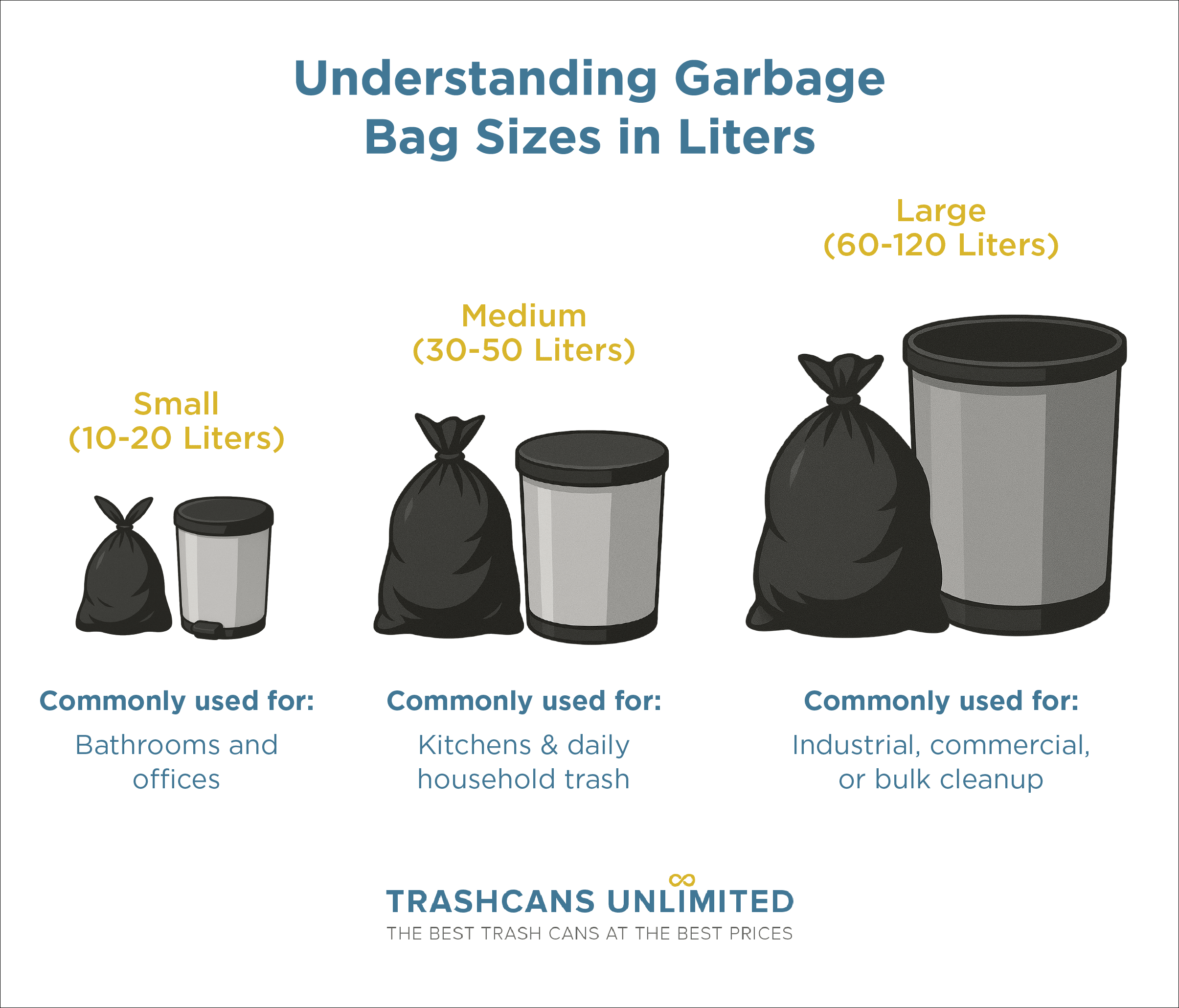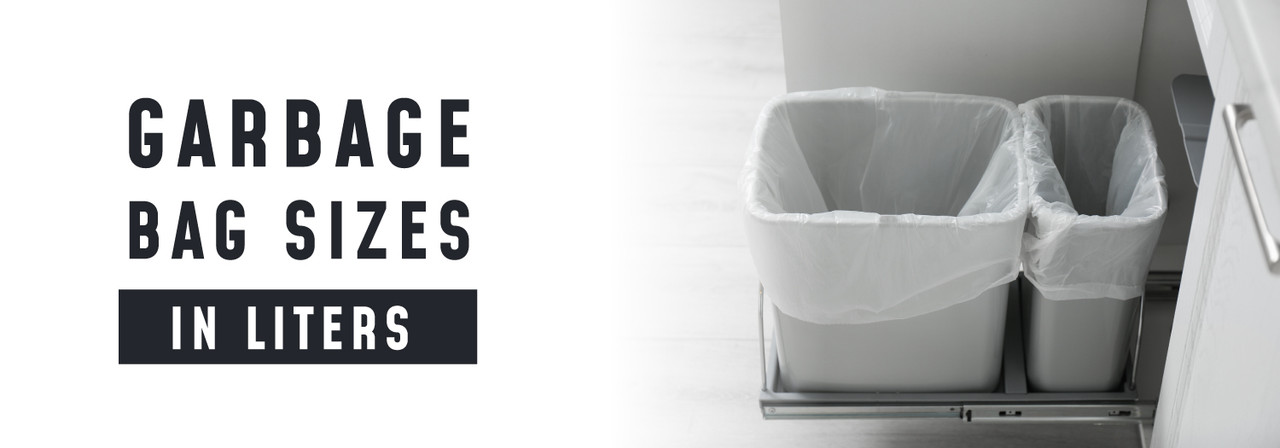Originally posted on 9th Aug 2024
Knowing the different sizes of garbage bags in liters is essential for effective waste management. The most common sizes range from small 20-liter bags, suitable for household waste, to large industrial 120-liter bags. Understanding these sizes ensures that we choose the right bag for our specific needs, whether it's for a kitchen trash can or a larger commercial bin.
Choosing the right garbage bag involves considering material, thickness, and size. Heavy-duty, thicker bags are better for sharp or heavy waste, while thinner bags work for everyday trash. Additionally, ensuring the bag size matches your trash can’s dimensions helps prevent tearing and overflow, promoting efficient waste disposal.
Key Takeaways
- Knowing standard garbage bag sizes helps in choosing the right one.
- Material and thickness are crucial for specific waste types.
- Match garbage bag size to trash can dimensions for optimal use.
Understanding Garbage Bag Sizes
When choosing garbage bags, it's important to understand various sizes and their capacities. Garbage bag sizes can be measured in liters or gallons. Standard sizes include small (about 10-20 liters), medium (30-50 liters), and large (60-120 liters).
To convert gallons to liters or liters to gallons, you can use the following conversion factors:
1 gallon = 3.78541 liters
1 liter = 0.26417 gallons
To convert a specific number of gallons to liters, simply multiply the number of gallons by 3.78541. For example:
- 10 gallons × 3.78541 = 37.85 liters
- 20 gallons × 3.78541 = 75.71 liters
To convert a specific number of liters to gallons, simply multiply the number of liters by 0.26417. For example:
- 10 liters × 0.26417 = 2.64 gallons
- 50 liters × 0.26417 = 13.21 gallons
This conversion is helpful in comparing garbage bag sizes that are measured in gallons and liters, ensuring you choose the correct size for your needs.
Conversion Chart:
| Size | Liters | Gallons | Typical Dimensions (in) |
| Small | 10-20 | 2.6-5.3 | 12-18 W x 20-28 H |
| Medium | 30-50 | 7.9-13 | 20-24 W x 30-36 H |
| Large | 60-120 | 15.8-31.7 | 25-36 W x 34-48 H |
Shape and Capacity:
Garbage bags come in various shapes, such as square or rectangular. Understanding the perimeter and circumference can help in choosing the right bag. For example, a bag with a 20-inch circumference and 34-inch height generally holds about 30 liters.
Special Features:
Some bags feature drawstrings or handles, which can affect their capacity slightly. It's always good to check a garbage bag size chart to ensure compatibility with your needs.
How to Measure for Proper Fit
It’s not enough to just grab a bag labeled “30 liters” and hope it fits. Trash cans come in different shapes, and if the bag is too narrow or too short, you’ll end up fighting with it every time you take out the trash. A quick measurement of your bin will save you the headache.
For round bins (like bathroom or office cans):
- Measure across the top of the bin (the diameter).
- Use this formula to get the bag width: (diameter × 3.14) ÷ 2.
Think of it as finding half the “wrap-around” of the bin.
For bag height: take the bin’s height and add 3–4 inches so the bag can hang over the rim and tie easily.
For rectangular bins (like most kitchen trash cans):
- Measure the length (front to back) and the width (side to side) across the top.
- Add those two numbers together, then divide by 2. That’s your bag width.
Basically, you’re averaging the two sides so the bag can cover the opening comfortably.
For bag height: again, bin height + 3–4 inches.
Example: If your rectangular kitchen bin is 16" wide and 12" deep, then:
- (16 + 12) ÷ 2 = 14" bag width
- Bin height 24" + 3" overhang = 27" bag height
So, you’d look for a bag that’s about 14" wide and 27" tall. That way, it slips on easily, doesn’t tear at the corners, and ties neatly at the top.
Sizing for Commercial and High-Volume Bins
For facility managers or anyone handling high-traffic areas, garbage bag selection goes beyond household needs. Large-format bins may require 120-liter or greater capacity bags, often in heavy-duty or compostable materials to meet environmental standards.
In offices, restaurants, or schools, it’s worth investing in durable liners that withstand frequent changes without splitting. Check local regulations, as some areas require compostable bags for food waste or recycled-content bags for compliance.

Material and Thickness
The material and thickness of garbage bags are key factors in determining their durability and suitability for different uses.
Materials:
- Low-Density Polyethylene (LDPE): Known for its flexibility, LDPE is often used for kitchen and heavy-duty bags.
- High-Density Polyethylene (HDPE): This material is more rigid and puncture-resistant, ideal for lighter trash.
- Eco-Friendly Options: Degradable, biodegradable, compostable, and recycled materials are increasingly prevalent, catering to environmentally conscious consumers.
Thickness:
Bag thickness is typically measured in mils (one mil equals one-thousandth of an inch).
- Standard Thickness: Usually ranges from 0.5 to 1 mil, suitable for light household waste.
- Heavy-Duty Bags: These range from 2 to 3 mils, ideal for construction debris or garden waste.
- Super Heavy-Duty: Thickness of 4 mils or more, meant for industrial or very heavy loads.
Density:
- Low-Density Bags (LDPE): Thicker and less prone to tearing.
- High-Density Bags (HDPE): Thinner yet stronger, often used for commercial purposes.
Applications and Usage
Different garbage bag sizes cater to various needs. We use small bags for bathroom trash cans that hold personal waste, while medium bags fit kitchen use, handling daily food and packaging waste. Large bags are ideal for outdoor trash cans to collect garden debris or larger household waste.
For heavy-duty use, we choose durable bags designed for construction debris. These bags withstand sharp edges and heavy materials, ensuring efficient waste management on job sites. In industrial use, robust bags manage bulk waste, providing safe and effective containment.
| Garbage Bag Size (Liters) | Common Applications |
| 10-20 | Small Office Bins, Bathroom Trash Cans |
| 20-50 | Kitchen Use |
| 50-100+ | Outdoor Trash Cans, Garden Debris |
| 100+ | Industrial Use |
Durability is crucial. Heavy-duty bags resist tearing and puncturing, crucial for handling varied types of waste. We find these especially useful in industries and construction sites.
Using the right size bag improves efficient waste disposal. Smaller bags prevent overfilling in bathrooms, while larger bags reduce the frequency of emptying outdoor bins. Adapting bag size to waste type and disposal habits enhances overall waste management efficiency.
Tips for Preventing Rips and Leaks
A bag that tears or leaks is more than an inconvenience. It can be a smelly disaster. To avoid it:
- Don’t overload bags beyond their listed capacity.
- Double-bag only when dealing with extra-heavy or sharp waste.
- Choose material that matches the job: LDPE for flexibility, HDPE for puncture resistance.
Eco tip: Right-sizing your bag is just as important as choosing eco-friendly materials. A bag that’s too big or unnecessarily thick wastes plastic, while a well-fitted one manages trash effectively and sustainably.
Special Features of Trash Bags
When we choose trash bags, certain features can make a big difference in daily use.
Drawstrings are a common and practical feature. These make it easy to close and tie the bag securely, preventing spills.
Odor control is another desirable feature, particularly for kitchen use. Bags designed with odor-neutralizing technology can keep unpleasant smells contained, ensuring a fresher environment.
Reinforced bottoms help prevent leaks and tears. This feature is especially useful for heavier or bulkier waste, ensuring the bag doesn't fail when you least expect it.
Puncture-resistant materials offer added durability. Such bags are ideal for handling sharp or rough items that might otherwise tear through.
A string liner can provide an extra layer of protection and ensure the bag stays in place within the bin. It's a simple yet effective feature that can enhance usability.
Impact of Local Regulations and Environmental Considerations
Local regulations play a crucial role in waste management strategies. They dictate the types of garbage bags we can use, their sizes, and materials. For instance, some areas mandate biodegradable bags to reduce non-degradable waste.
Local Regulations:
- Mandatory use of reusable bags in specific regions.
- Bans on single-use plastic bags.
- Regulations on minimum strength and durability for garbage bags.
Environmental Considerations:
- Promoting compostable bags for organic waste.
- Encouraging separation of recyclables to minimize landfill usage.
- Implementation of eco-friendly alternatives to traditional plastic bags.
These measures support a cleaner environment by reducing pollution and waste. By adhering to such regulations, we can contribute to sustainable waste management.
Proper waste separation and usage of size-appropriate bags not only comply with local policies but also enhance the collection and recycling processes. By choosing the right size and type of bag, we can effectively manage waste and promote a clean environment.
Common Issues and Solutions
Efficient waste management can be challenging due to issues like overflow, tearing, or not meeting local regulations.
Common garbage bag problems and their solutions:
|
Problem |
Solution |
|
Overflow and spillage: Bag too small for the can, leading to messes. |
Choose a larger bag size (e.g., 80–100L) and always measure your trash can for proper fit. |
|
Tearing and punctures: Thin bags rip when handling sharp or heavy waste. |
Use heavy-duty bags (2–3 mils for tough jobs, 4+ mils for industrial or construction debris). |
|
Limited storage space: Hard to store bulk packs of garbage bags. |
Use compressible storage bags and organize by size for easy access. |
|
Regulation compliance: Wrong type of bag for recycling or composting. |
Check local rules; choose eco-friendly, biodegradable, or compostable bags where required. |
|
Large projects: Standard bags can’t handle renovation or landscaping waste. |
Use contractor bags, designed to be larger and stronger for heavy, bulky loads. |
By understanding these common issues and implementing the right solutions, you can improve waste management efficiency and reduce the inconvenience of improper bag usage.
Find the Perfect Garbage Bags for Your Needs at Trashcans Unlimited
Selecting the right garbage bags is essential for efficient waste management, whether at home or in a commercial environment. At Trashcans Unlimited, we offer high-quality options like the Glaro Clear Trash Can Liner Bags, available in three convenient sizes. These durable bags are sold in cases of 100, ensuring you have a reliable supply on hand. They are designed to fit a variety of trash cans, providing the perfect solution for everything from everyday household waste to more demanding commercial applications. With options that cater to different sizes and capacities, these clear trash bags allow for easy identification of contents.
Explore the Glaro Clear Trash Bags and other waste management solutions at Trashcans Unlimited to find the perfect match for your trash disposal needs. With our range of sizes and durable construction, you can ensure efficient, hassle-free waste management every time.

